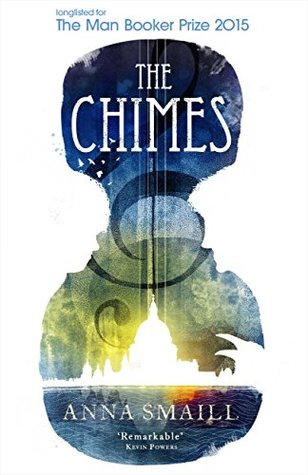
Genres: Fantasy, Queer Protagonists, Sci Fi, Science Fantasy
Representation: M/M
Published on: 12th February 2015
Goodreads

The Chimes is set in a reimagined London, in a world where people cannot form new memories, and the written word has been forbidden and destroyed.
In the absence of both memory and writing is music.
In a world where the past is a mystery, each new day feels the same as the last, and before is blasphony, all appears lost. But Simon Wythern, a young man who arrives in London seeking the truth about what really happened to his parents, discovers he has a gift that could change all of this forever.
A stunning literary debut by poet and violinist Anna Smaill, The Chimes is a startlingly original work that combines beautiful, inventive prose with incredible imagination.
It’s quite probable that you’ve never heard of Anna Smaill, or her debut The Chimes. I consider myself well-read, and especially well-read in weird, beautiful books no one else has ever heard of, but I stumbled across The Chimes completely by accident, years after it had been published. I have a spiderweb spread across dozens of sources, but The Chimes never brushed against a single one of my threads.
And that is appalling, because this is an incredible book that deserves so much attention!
That said, I do understand why it might not have made the bestseller lists – it’s a book you have to devote yourself to. This is no simple, breezy adventure story, but a complex imagining of a future world, written using a great deal of technical musical terms, and told via an unreliable narrator – unreliable because, in the world of The Chimes, humans can no longer form memories easily. And what’s a narrator who can’t remember his own story?
The thing is though, if you do give this book your full attention? If you’re willing to give it the focus required? Then it unfolds into page after page of treasures, breathtakingly original and incredibly beautiful.
To say Chimes is lyrically written is like saying the ocean is wet. It’s only barely a metaphor to say that this book makes music as you read.
Okay, so it’s technically incredible. How about the story?
The book opens with Simon, the unreliable narrator I mentioned above, waiting with a bag full of objectmemories – literally, objects to which specific memories are anchored, the only way people can keep memories now. When he’s picked up by a passing trader’s cart, he makes his way to London. He has his bag, and a song – a tune, really.
He’s looking for someone.
At first it’s just the shouts and calls of song from traders. Then there are driving bursts of melody from highboy, viol, clarionet. We trot in past blankfaced buildings with hollow windows and buckled mettle and narrow cobbled streets. Music spills from the living quarters above shops, spins up from groups of musicians standing in door frames. Trompets send out brassy martial calls along the roof turrets. Viols speak with voices high and yearning and full of ache like human song. And under it all is the hard horsehoof beat of tambors. It grows and grows in a vast crescendo.
The tune leads him where it’s supposed to lead him…but the door there is closed. And in a city that’s full of music and song, Simon is drawn towards the one source of silence – a mysterious metal, hunted for by the gangs of homeless teenagers who live by the river. They call the metal the Lady, and sell it to the Order – the group of musicians/scholars/bureaucrats/priests who run the country.
And the Order? Uses it for the Carillion – the enormous instrument that, multiple times a day, plays music which reaches right into the minds and hearts of every citizen.
It’s a loud song.
Simon is adopted into the Five Rover pact, a group of teens run by the blind Lucien, when he proves to have a talent for ‘hearing’ the Lady. And with nowhere else to go, Simon stays.
But he has questions. Questions about his own memories. About things he doesn’t remember. And Lucien just might have answers – not only about Simon’s memories, but about the very nature of human memories – and why humans can’t keep them anymore.
This is a dystopia like no other, every word a note in an unbelievable melody, unfolding page by page into something incredibly unique and truly special. And although Simon does have a special gift, as mentioned in the book description, this isn’t a chosen one story where one person can save the day. It’s much more complicated than that – even if two boys might be the key to kickstarting devastating change.
Smaill doesn’t talk down to the reader; Chimes is all show and no tell. But what it shows you is incomparably gorgeous and strange, and even if this book requires you to hit the ground running in terms of being dropped into this unfamiliar world, you’ll find yourself turning the pages faster and faster as the music pulls you under and sweeps you away.
I love it dearly. I think, if you give it a chance, you will too.






Leave a Reply